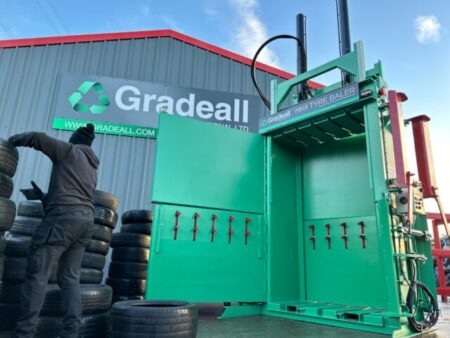20 September 2025
By Roger Kennedy
roger@TheCork.ie
As environmental regulations tighten and sustainability becomes central to business strategy, Cork enterprises are discovering innovative solutions to one of Ireland’s most pressing waste challenges
Cork, Ireland’s largest county and second-most populous city, stands at the forefront of a waste management revolution. With the Rebel County generating significant volumes of waste tyres annually from its diverse industrial base—spanning pharmaceuticals, agriculture, maritime operations, and transport—the need for efficient recycling solutions has never been more critical. Northern Ireland-based Gradeall International, a specialist manufacturer of tyre recycling equipment, is among the companies providing advanced technology to transform how Cork businesses handle end-of-life tyres.

The scale of the challenge facing Cork and the wider Munster region is substantial. From the busy Port of Cork in Ringaskiddy to the agricultural heartlands of North Cork, from the industrial estates of Little Island to the tourist destinations along the Wild Atlantic Way, every sector generates tyre waste that requires responsible disposal. With landfill bans in place and environmental regulations becoming increasingly stringent, Cork businesses are turning to innovative solutions like professional tyre balers and specialised cutting equipment to manage their waste streams more effectively.
Cork’s Unique Waste Management Landscape
The Port and Maritime Sector
The Port of Cork, Ireland’s second-largest port, handles millions of tonnes of cargo annually through its facilities at Ringaskiddy, Cobh, Cork City, and Bantry Bay. This maritime activity generates significant tyre waste from port vehicles, container handlers, and heavy goods vehicles. The port’s commitment to becoming a carbon-neutral facility by 2050 means every aspect of operations, including waste management, must be optimised.
Maritime operations require robust equipment capable of handling large commercial vehicle tyres. Modern tyre balers can reduce these tyres to compact bales, making storage and transportation significantly more efficient—a crucial consideration for space-constrained port facilities. The ability to reduce tyre volume by up to 80% means valuable port real estate can be utilised more effectively.
Pharmaceutical and Chemical Industries
Cork’s pharmaceutical sector, anchored by major facilities in Ringaskiddy and Little Island, operates one of Europe’s largest pharmaceutical clusters. These facilities maintain extensive vehicle fleets for logistics and on-site operations, generating a steady stream of end-of-life tyres. Given the sector’s stringent environmental standards and commitment to sustainability, proper tyre disposal isn’t just a regulatory requirement—it’s part of their corporate responsibility mandate.
The pharmaceutical industry’s focus on data and metrics aligns well with modern recycling equipment that offers IoT connectivity and performance tracking. Companies can monitor their waste reduction efforts in real-time, generating the sustainability reports increasingly demanded by stakeholders and regulatory bodies.
Agricultural Heartlands of North and East Cork
From Mitchelstown to Mallow, from Fermoy to Midleton, Cork’s agricultural sector forms the backbone of Ireland’s food production. The county’s dairy farms, beef operations, and tillage enterprises rely heavily on tractors and agricultural machinery, all requiring regular tyre replacement. Agricultural tyres present unique challenges—they’re larger, heavier, and often contaminated with soil and organic matter.
North Cork’s farming communities, particularly around Kanturk and Charleville, are discovering that proper tyre processing can transform a disposal headache into a manageable process. Equipment specifically designed for agricultural tyres, including sidewall cutters that prepare tyres for baling, makes on-farm or cooperative-based processing feasible.
The Technology Revolution in Waste Processing
Understanding Modern Tyre Recycling Equipment
The evolution from manual tyre handling to automated processing represents a paradigm shift in waste management. Modern tyre balers, such as those manufactured by companies like Gradeall International, incorporate hydraulic systems capable of generating 85 tonnes of compression force, creating dense, uniform bales that meet international shipping standards like PAS108.
“The technology available today is transforming how businesses approach tyre disposal,” explains Conor Murphy, Director at Gradeall International. “Whether it’s a small garage in Bandon or a large industrial facility in Cork Harbour, there’s equipment scaled to meet their specific needs.”
The Baling Process: Engineering Meets Efficiency
The baling process begins with tyre preparation. For passenger car tyres, this might involve minimal preparation, but truck and agricultural tyres often require sidewall removal to achieve optimal bale density. Sidewall cutters use precision hydraulic blades to separate the tyre’s sidewall from the tread, reducing the tyre’s volume and making it easier to compress.
Once prepared, tyres are loaded into the baler’s chamber where hydraulic rams compress them into dense cubes. Modern balers can process between 90 and 140 tyres per hour, depending on tyre size and type. The resulting bales, typically weighing between 800 and 1,200 kilograms, are secured with high-tensile wire and ready for storage or transport.
Beyond Baling: Comprehensive Processing Solutions
While baling represents a crucial step in tyre recycling, it’s part of a broader processing ecosystem. Tyre shredding, granulation, and pyrolysis all play roles in the complete recycling chain. However, baling offers distinct advantages for many Cork businesses:
- Space Efficiency: Baled tyres require 80% less storage space
- Transport Economics: More tyres per truck means lower transportation costs
- Fire Safety: Baled tyres present significantly reduced fire risk
- Handling Ease: Uniform bales are easier to move with standard equipment
Economic Implications for Cork Businesses
Cost Reduction Opportunities
For Cork businesses, the economics of proper tyre management are compelling. Consider a hypothetical transport company operating from Cork’s Kinsale Road Commercial Park with a fleet of 50 vehicles. Each vehicle might require tyre replacement every 18-24 months, potentially generating approximately 200 waste tyres annually. Traditional disposal methods—paying for collection and disposal—can cost approximately €5-10 per tyre based on industry estimates, potentially totalling €1,000-2,000 annually.
By implementing on-site baling, businesses can potentially reverse this cost structure. Baled tyres have value in the recycling market, particularly for export to facilities specialising in rubber recovery. While specific returns vary with market conditions, the shift from cost centre to potential revenue stream is significant.
Job Creation and Skills Development
The adoption of advanced recycling technology creates employment opportunities across Cork. Equipment operators, maintenance technicians, and logistics coordinators are needed to run modern recycling operations. Cork Institute of Technology (now Munster Technological University) has recognised this trend, incorporating waste management and recycling technology into its environmental engineering programmes.
Local employment extends beyond direct operation. Equipment servicing, spare parts supply, and logistics support create a multiplier effect. For every direct job in recycling operations, industry estimates suggest 2-3 indirect jobs are supported.
Supporting Cork’s Green Economy
Cork City Council’s Climate Adaptation Strategy emphasises the transition to a circular economy. Proper tyre recycling directly supports these objectives by:
- Reducing illegal dumping in areas like the Cork Harbour region
- Decreasing greenhouse gas emissions from tyre decomposition
- Creating raw materials for new products
- Supporting local environmental initiatives
Environmental Benefits for the Rebel County
Protecting Cork’s Natural Heritage
Cork’s natural beauty—from the beaches of West Cork to the Blackwater Valley—depends on responsible waste management. Improperly disposed tyres can leach chemicals into soil and water, create breeding grounds for mosquitoes, and pose fire hazards. The 2016 tyre fire in County Kilkenny, which burned for days and required massive firefighting resources, serves as a reminder of the risks.
By processing tyres through proper channels, Cork businesses protect the environment that supports tourism, agriculture, and quality of life. The Lee Valley, Gougane Barra, and coastal areas from Youghal to Bantry benefit from reduced environmental pressure.
Climate Action and Carbon Reduction
Ireland’s Climate Action Plan commits to a 51% reduction in greenhouse gas emissions by 2030. While tyre recycling might seem a small component, the cumulative impact is significant. Each tonne of tyres properly recycled rather than burned or landfilled saves approximately 1.5 tonnes of CO2 equivalent emissions according to industry estimates.
For Cork, with its ambitious target of carbon neutrality by 2030, every contribution matters. The county’s businesses, from the English Market traders to multinational corporations, are recognising that sustainable waste management is part of their climate responsibility.
Regional Success Factors
Infrastructure and Logistics
Cork’s infrastructure supports efficient tyre recycling operations. The M8 motorway connects Cork to Dublin, facilitating transport to processing facilities. The Port of Cork enables export of baled tyres to international markets. Regional waste management facilities in Bottlehill, Kilbarry, and Rossmore provide collection points for smaller generators.
The planned expansion of Cork’s industrial zones, particularly around Whitegate and Carrigaline, includes provision for waste processing facilities. This forward-thinking approach ensures recycling infrastructure keeps pace with industrial growth.
Regulatory Framework and Support
The Southern Region Waste Management Plan, covering Cork City and County, prioritises circular economy principles. Local authorities provide guidance and support for businesses implementing recycling programmes. Environmental Protection Agency offices in Cork ensure compliance while offering technical assistance.
Cork County Council’s Economic Development Fund has supported several recycling initiatives, recognising the sector’s economic potential. These investments in infrastructure and technology position Cork as a leader in sustainable waste management.
Looking Ahead: Cork’s Recycling Future
Emerging Technologies

The future of tyre recycling in Cork will likely incorporate advanced technologies currently in development. Artificial intelligence for automated sorting, blockchain for waste tracking, and chemical recycling processes that break tyres down to molecular components all show promise.
Cork’s tech sector, centred around the Cork Airport Business Park and Mahon, could play a role in developing these solutions. The convergence of traditional industry and tech innovation positions Cork uniquely for leadership in sustainable technologies.
Educational Initiatives
Munster Technological University’s Bishopstown campus is developing programmes focused on circular economy principles. These initiatives ensure Cork has the skilled workforce needed to operate and maintain advanced recycling equipment. Secondary schools across Cork are incorporating sustainability into their curricula, creating awareness among future business leaders.
Policy Evolution
As environmental regulations continue to evolve, Cork businesses that invest in proper recycling infrastructure today position themselves advantageously for tomorrow. Extended Producer Responsibility schemes, carbon pricing, and circular economy legislation will likely make proper tyre management not just advisable but mandatory.
Conclusion: Cork Leading Ireland’s Recycling Revolution
From the bustling quays of Cork City to the rural landscapes of Beara Peninsula, from the industrial facilities of Ringaskiddy to the farms of the Blackwater Valley, Cork is embracing sustainable waste management. The adoption of advanced tyre recycling technology represents more than operational efficiency—it’s a commitment to environmental stewardship and economic sustainability.
As Cork continues its journey toward carbon neutrality and circular economy leadership, proper tyre recycling will play an increasingly important role. The technology exists, the economic case is clear, and the environmental benefits are undeniable. For Cork businesses, the question isn’t whether to adopt modern recycling practices, but how quickly they can implement them.
The transformation of Cork’s approach to tyre recycling demonstrates that environmental responsibility and business success aren’t mutually exclusive—they’re increasingly interdependent. As the Rebel County rebels against traditional waste management approaches, it’s setting an example for Ireland and beyond.
For more information about tyre recycling solutions for Cork businesses, visit Gradeall International’s comprehensive resources or explore local waste management options through Cork County Council’s environmental services.
